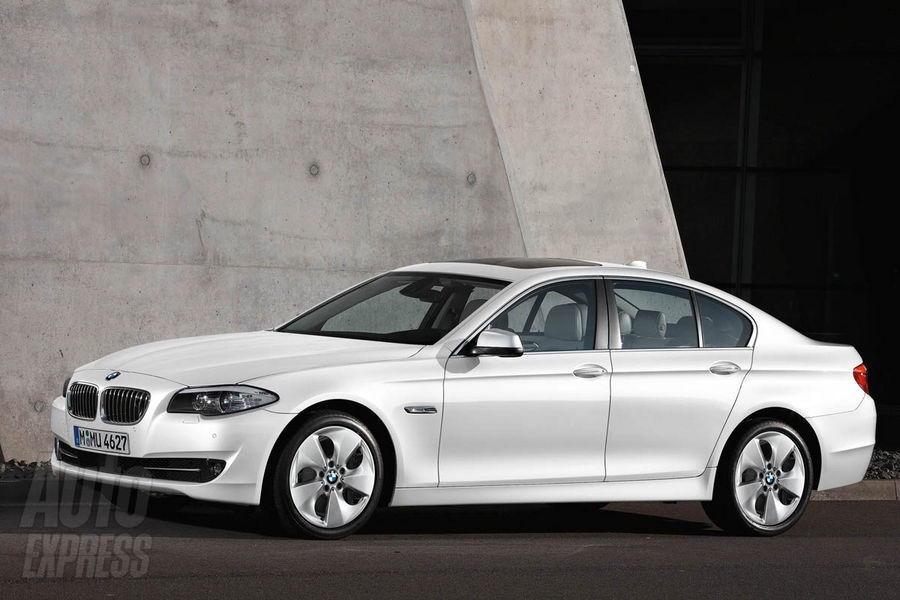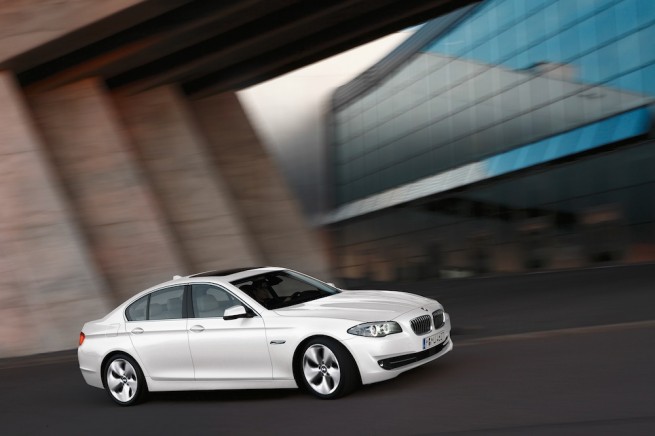
The new BMW 520d EfficientDynamics Saloon will arrive in September 2011, offering 184hp and 380Nm of torque from the 20 litre turbo diesel, offering 62.8mpg fuel consumption and 119g/km CO2 emissions.
The BMW 520d Efficient Dynamics Edition will get a new four-cylinder diesel engine with BMW TwinPower Turbo technology. This 2.0-litre all-aluminium unit features Variable Twin Turbo two-stage turbocharging and common-rail diesel injection with piezoelectric injectors.
The 520d ED is fitted with a longer final drive ratio to reduce revs at motorway cruise speeds, low-drag alloy wheels and low-rolling resistance tyres on top of the standard 520d equipment. Most Fives already have stop-start and an Optimum Gear Shift Indicator to let the driver know when the most efficient time is to change gear.
The new BMW 525d offers a 10 kW power increase over the previous model, developing 160 kW/218 hp at 4 ,400 rpm. Peak torque of 450 Newton metres (332 lb-ft) is now available between 1,500 and 2,500 rpm. The extra agility and sprinting power is reflected in a further improvement in 0-100 km/h (62 mph) acceleration times, which now stand at 7.0 seconds for the Sedan and 7.2 seconds for the Touring model. Top speeds are 243 km/h (150.9 mph) (automatic: 239 km/h / 148.5 mph) for the new BMW 525d Sedan and 236 km/h (146.6 mph) (automatic: 233 km/h / 144.8 mph) for the BMW 525d Touring.
Fewer CO2 emissions, more driving pleasure: The BMW 520d EfficientDynamics Edition – available from September 2011.


Press Release
New four-cylinder petrol engines with BMW TwinPower Turbo technology.
With the launch of a new generation of four-cylinder engines with BMW TwinPower Turbo technology, the BMW 5 Series engines for the upper mid-range market now lead the way on efficiency and sporty power delivery in the petrol segment too. This world-exclusive technology equips the two 2.0-litre engines with twin-scroll turbocharging, High Precision Injection direct injection, VALVETRONIC variable valve timing and Double-Vanos variable camshaft timing. This combination of features is inspired by the technology package used on the multi-award-winning 225 kW/306 hp six-cylinder in-line BMW TwinPower Turbo engine of the BMW 535i. Now BMW has adopted this highly efficient performance-boosting technology in the four-cylinder engines as well. The system, which delivers the exhaust gases from each pair of cylinders to the turbine via two separate channels, both in the exhaust manifold and in the turbocharger itself, provides more responsive performance. The fuel supply is precisely metered by the direct-injection system with solenoid injectors, while the latest version of the VALVETRONIC system provides even more precise air mass control and, in combination with Double-Vanos variable intake and exhaust camshaft timing, optimises both efficiency and response.
As fitted in the new BMW 520i, the four-cylinder engine develops maximum power of 135 kW/184 hp at 5, 000 rpm and peak torque of 270 Newton metres (199 lb-ft), which is available between 1,250 and 4,500 rpm. Instantaneous power response helps the BMW 520i Sedan perform the 0 to 100 km/h (62 mph) sprint in 7.9 seconds (automatic: 8.0 seconds), while the BMW 520i Touring accomplishes the same task in 8.3 seconds (automatic: 8.4 seconds). Top speeds are 227 km/h (141 mph) (automatic: 226 km/h / 140.4 mph) for the Sedan and 220 km/h (36.7 mph) (manual and automatic) for the Touring model. Simultaneous efficiency improvements are reflected in average fuel consumption (as per EU test cycle, depending on tyre format) of 6.8 - 7.0 l/100 km (40.3 - 41.5 mpg imp) (automatic: 6.5 - 6.7 litres / 42.2 - 43.5 mpg imp) and CO2 emissions of 157 - 163 grams (149 - 155 grams) per kilometre. For the BMW 520i Touring, the corresponding figures are 7.0 - 7.3 l/100 km (38.7 - 42.2 mpg imp) (automatic: 6.7 - 7.0 litres / 40.3 - 42.2 mpg imp) and 163 - 170 grams (automatic: 156 - 163 grams) per kilometre.
In the new BMW 528i, with modified turbocharging and injection technology, the four-cylinder engine develops maximum power of 180 kW/245 hp at 5,000 through 6,500 rpm, and peak torque of 350 Newton metres (258 lb-ft), which is available between 1,250 and 4,800 rpm. 0 to 100 km/h (62 mph) is accomplished in 6.2 seconds for the new BMW 528i Sedan (automatic: 6.3 seconds), and 6.4 seconds for the BMW 528i Touring (automatic: 6.6 seconds). Top speeds are 250 km/h (155 mph) for the Sedan and 244 km/h (151.6 mph) for the Touring model (in both cases the figures are the same for both manual and automatic versions). The new BMW 528i Sedan achieves average fuel consumption (as per EU test cycle, depending on tyre format) of 6.8 - 7.1 l/100 km (39.8 - 41.5 mpg imp) (automatic: 6.5 - 6.8 litres / 41.5 - 43.5 mpg imp), and CO2 emissions of 159 - 165 grams (automatic: 152 - 158 grams) per kilometre. For the new BMW 528i Touring, the corresponding figures are 7.1 - 7.4 l/100 km (38.3 - 39.8 mpg imp) (automatic: 6.8 - 7.1 litres / 39.8 - 41.5 mpg imp) and 165 - 172 grams (automatic: 159 - 166 grams) per kilometre.
BMW 520d EfficientDynamics Edition: unique in the upper mid-range segment - a premium sedan with CO2 emissions of 119 g/km.
From autumn 2011, in parallel with the regular BMW 520d, an ultra-fuel-efficient version of this sedan will be offered: the BMW 520d EfficientDynamics Edition. With unchanged maximum power (135 kW/184 hp) and torque (380 Newton metres / 280 lb-ft), this model records average fuel consumption in the EU test cycle of 4.5 l/100 km (62.8 mpg imp) and CO2 emissions of 119 grams per kilometre. This is around ten per cent better consumption than the most fuel-efficient segment competitors, despite the fact that the BMW 520d EfficientDynamics Edition is more powerful than the competitor models.
With a 0-100 km/h (62 mph) acceleration time of 8.2 seconds and a top speed of 231 km/h (143.5 mph), even this most fuel-efficient model in the BMW 5 Series boasts typical sporty BMW performance. Its extra-efficient 2.0-litre diesel engine is, like that of the familiar BMW 520d, equipped with a centrifugal pendulum absorber which reduces irregular running at low engine speeds for greater refinement. It is also combined with a range of other efficiency-enhancing measures. These include Auto Start-Stop, an Optimum Shift Indicator, Brake Energy Regeneration and active cooling flap control, plus a longer final drive ratio and special aero rims with "Streamline" styling.